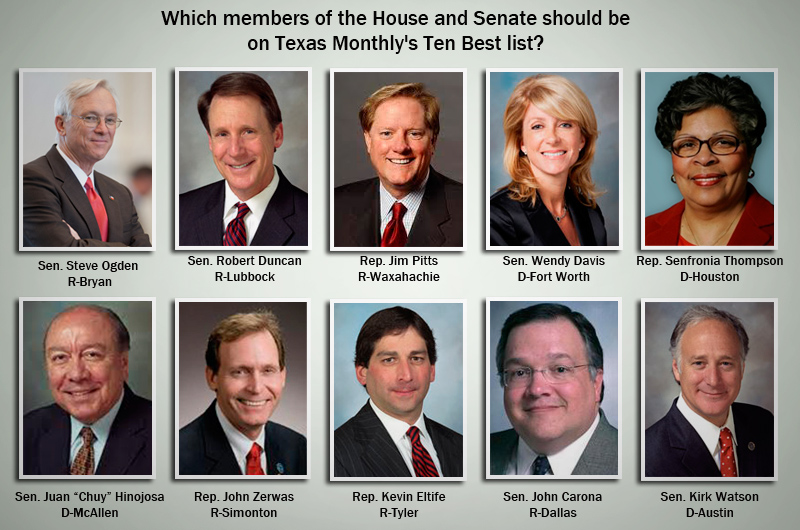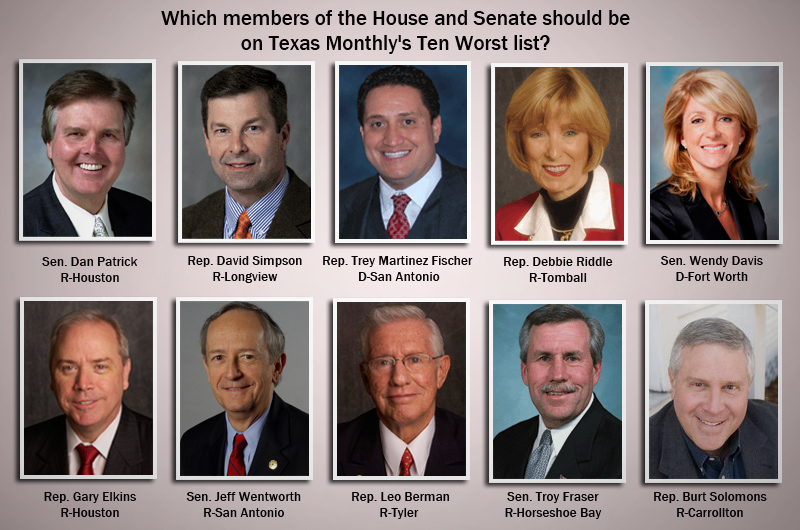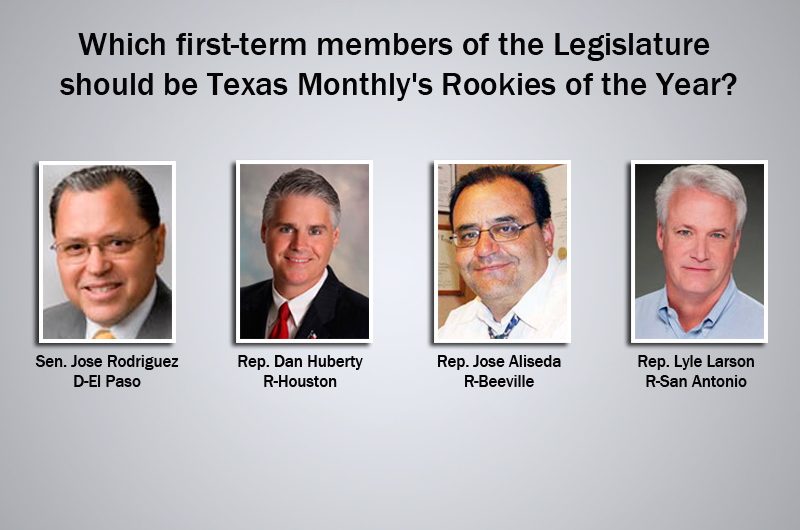Serving in the U.S. Congress is a pretty big deal. Members get a front-row seat in the theater of American history. They make $174,000 a year and, assuming voters keep them around long enough, get a nice pension.
So it’s not surprising that Congress has generally been a big draw for members of the “part-time” Texas Legislature, which has produced a long list of U.S. representatives eager to represent a slice of the Lone Star State in the nation’s capital.
Among them are famous Texans like John Nance Garner, Sam Rayburn, Barbara Jordan and Charlie Wilson. Many of the current members of Congress also got their start in Austin, including Ralph Hall, John Culberson, Kevin Brady, Kenny Marchant, Lloyd Doggett, Henry Cuellar, Gene Green and Eddie Bernice Johnson.
There are, no doubt, members of the Legislature right now who’ll eventually jump at the chance to go to Washington. But judging from the way they’ve gone about producing a new congressional map, the Legislature seems to have little collective enthusiasm for it, much less a burning drive to protect any sitting U.S. House members.
Part of it probably stems from the sullied reputation of Washington, awash in debt, perceived as out of touch with average Americans and paralyzed by partisan gridlock. There isn’t much love lost, either, between Austin and D.C., a favorite whipping post for the Tea Party activists who have dominated state and national politics for the last couple of years. Some state legislators also find the incessant travel and fundraising unattractive. Begging for money for a federal race, in which individuals can give no more than $2,500, can seem downright un-Texan to politicians used to raising unlimited sums.
Both Sen. Kel Seliger, R-Amarillo, and Rep. Burt Solomons, R-Carrollton, co-authors of the congressional map working its way through the Legislature, said no member of the state House or Senate has asked them to draw a district they could run in and win.
“The allure of going to Washington — of Mr. Smith goes to Washington — doesn’t seem to be quite as prevalent as it used to be, at least for this bit of the cycle,” Solomons said.
Seliger theorized that legislators feel like they can have more of an impact in Austin, not so rigidly partisan like Washington, and aren’t eager to confront the high “level of disdain” ordinary citizens have for Congress.
“My guess is with Anthony Weiner’s antics this week, it’s not getting any better,” Seliger said, referring to the New York congressman facing calls for his resignation in the wake of a scandal about sexually explicit photos and texts.
There’s also a fairly widespread feeling in Austin that Texas members of Congress don’t pay much attention to the needs back home until they need something themselves — like a good district to represent. It’s not uncommon to see members of Congress walking the halls of the state Capitol every 10 years, when lawmakers have to redraw boundaries for the Legislature and the Texas congressional delegation. Otherwise, they aren’t such a common sight in these parts.
Suffice it to say that members of the Legislature care more about their own districts than those conceived for the hallowed members of the U.S. House.
On the day the state House passed its own map, members dispensed with their congratulatory resolutions and procedural business in about an hour, which in lower-chamber time-keeping might as well be the speed of light. There was no need to issue a quorum call. Reporters went scrambling for their guidebooks to identify “furniture” members who almost never talk about issues but were eager to discuss (and knew intimately) the proposed configuration of their districts down to the VTD, or Voter Tabulation District.
Both the House and Senate also adhered to the tradition of keeping their hands off each other’s maps, passing them simultaneously — trusting but verifying — without the slightest change in either chamber. The Legislature never got off first base on congressional redistricting in the regular session, and that didn’t seem to bother anybody much in the Legislature. It did bother the GOP congressional delegation, which in a special legislative session is now on the verge of getting the strong Republican map it wants.
Ambition or boredom will certainly drive some House or Senate member, perhaps one eager to represent a new Hispanic district split between Austin and San Antonio, to run for “higher” office in Washington. Then the vast majority left behind will get to moan and complain when their old colleague returns to visit.
In 10 years.
Locally Grown
Sen. Steve Ogden, R-Bryan, is the latest lawmaker to say it: A $4 billion shortfall in state funding doesn’t have to mean teachers without jobs.
School districts could spend their reserve funds, he told his colleagues in the Senate. They could “tighten their belts in other areas.” Or, he said, they could pursue what he called “a good exercise in democracy”: Ask voters to raise local taxes.
Across the state, schools are considering the latter. A question heavy on their minds: Will the same public who sent lawmakers to Austin with the overwhelming no-new-taxes imperative accept paying more locally to preserve programs and jobs?
In 2006, the Legislature voted to reduce property tax rates by a third, setting the majority of districts’ property tax rates at $1 per $100 of property value. Current law caps property tax rates at $1.17 and requires a “tax ratification election” for districts to levy more than 4 cents higher than their 2006 rate. Most districts will likely finalize their budgets in July, when they know the exact details of the new school finance plan from the Legislature, so it’s too soon to tell whether the reduction in state financing will result in a wave of property tax increases across the state. Look for boards to make those decisions in late summer.
Catherine Clark, an associate executive director at the Texas Association of School Boards, said her organization, which provides legal services to school boards, had received fewer inquiries about conducting TREs than at this time last year. She said that was because districts, ever cautious about undergoing potentially divisive campaigns to increase taxes, were likely still awaiting the final school finance plan and July property value appraisals.
But a handful of districts across the state have already taken the plunge.
Keller ISD, a midsized district located in a suburb of Fort Worth, called an election for June 18 to go from $1.04 to the maximum $1.17. Mark Youngs, a deputy superintendent there, said the increase was “purely to replace lost state dollars” and had been in the works since 2010. He said the board wanted to hold the election in June so that if it failed, the district could lay off workers in time for them to find other jobs.
“Many districts have [elections] in September after Labor Day, thinking that the good feelings of being back in school would increase the likelihood of passage,” Youngs said. “But then you are laying off in September and October, and districts have already staffed up.”
To successfully push a tax increase, school boards usually have to demonstrate they’ve explored all other options — and coping with $4 billion less in state funding will help them do that.
“It's not a matter of if we are going to have a TRE — it's a matter of when,” said Joe Smith, a former superintendent who runs texasisd.com, a clearinghouse of news and information for school officials. “That's the feeling that most of them have.”
Seeking Sanctuary (and More?)
Will it be another legislative Christmas tree, or will Sen. Tommy Williams, R-The Woodlands, like he has before, limit his homeland security bill to only the items on it?
Surprising few, Gov. Rick Perry added immigration and homeland security measures to the special session call this week, leading lawmakers to file some of the same immigration measures that didn’t survive the regular legislative session.
Williams’ SB 9 revives the contentious sanctuary cities legislation and would also expand the Secure Communities initiative, which aims to deport immigrants who run afoul of the law and are arrested and processed in detention facilities. The bill would also codify requirements the Department of Public Safety put in place years ago that require immigrants to prove their legal status before obtaining a driver’s license or ID.
Williams said during the regular session that he wanted to keep his homeland security bill and sanctuary cities legislation separate. And he did, watching an omnibus homeland security bill sail through the Senate but die in the House. And he watched HB 12, the sanctuary cities bill, die in the Senate after passing through the House on a party-line vote.
But the meshing together of these issues now could have lawmakers trying one last time to attach what they see fit. Rep. Debbie Riddle, R-Tomball, who made headlines in January after waiting outside the clerk’s office for hours to be the first to file immigration legislation, has already filed three bills of her own, including legislation that would make it a trespassing crime to be in the state illegally, make knowingly hiring an illegal alien a state jail felony, and another that would require state agencies annually report the cost of providing services to illegal immigrants. Riddle filed the same bills during the regular session, but none of them made it to the House floor for a vote.
Other lawmakers are hoping the session gives them another chance at expanding the dialogue between state and federal lawmakers. Rep. Will Hartnett, R-Dallas, introduced a resolution urging Congress to grant illegal immigrants a path to legal status or citizenship if they serve four years in the military after graduating from high school. Another resolution by Rep. John Garza, R-Corpus Christi, urges Congress to overhaul the country’s immigration system.
Williams’ SB 9 goes before the Senate Committee on Transportation and Homeland Security, the committee he chairs, on Monday. It’s likely to draw the same heated and emotional debate the bill saw the first time around. It’s more likely, however, to make it to Perry’s desk this time. Senate Democrats aren’t capable of preventing the measure from seeing floor action during the special session: The two-thirds vote is not needed to suspend the regular order of business, and they’re outnumbered 19 to 12.





